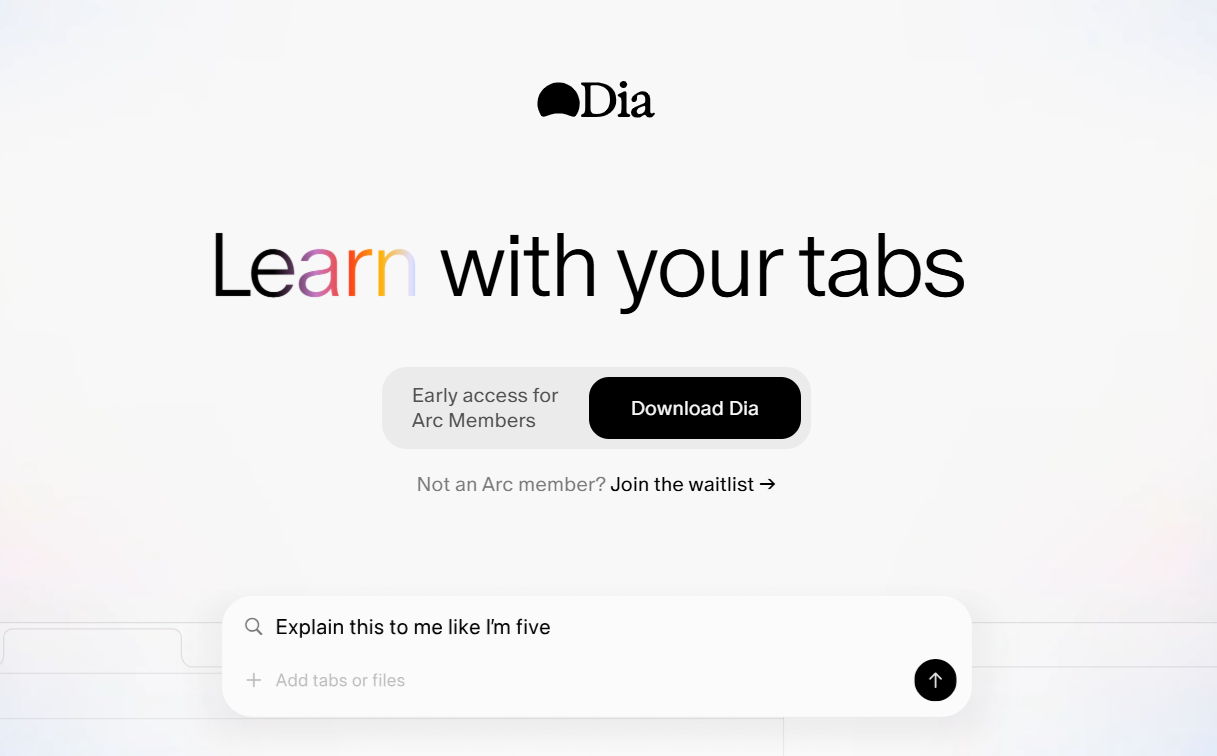Arc Browser's Creator Unveils 'Dia': The AI-First Browser That Could Reshape How We Navigate the Web
The Browser Company, maker of the critically acclaimed Arc browser, has just dropped a bombshell in the browser wars. Their latest creation, 'Dia,' isn't just another browser—it's an AI-powered companion that promises to fundamentally change how we interact with the internet. Currently in its first beta release, Dia represents a bold leap into a future where artificial intelligence doesn't just assist our browsing; it becomes an integral part of the experience.
The Evolution Beyond Arc: What Makes Dia Different
While Arc revolutionized browser design with its vertical tabs and innovative workspace management, Dia takes an entirely different approach. Rather than focusing on organization and aesthetics, Dia positions AI as the primary interface between users and the web.
The beta release introduces several groundbreaking features that set it apart from traditional browsers and even AI-enhanced alternatives like Microsoft Edge with Copilot or Google Chrome's experimental AI tools. Dia's AI doesn't just answer questions or summarize content—it actively participates in web navigation, content discovery, and task completion.
Key Features Driving the Buzz
Intelligent Content Synthesis
Dia's standout feature is its ability to synthesize information across multiple web sources in real-time. Instead of opening dozens of tabs to research a topic, users can ask Dia to compile information from various sources, creating comprehensive reports that would typically require hours of manual browsing.
Predictive Navigation
The browser learns user patterns and proactively suggests relevant content and websites. This goes beyond simple bookmarks or history-based suggestions—Dia analyzes context, time of day, and current projects to surface the most relevant information before users even search for it.
Conversational Web Interaction
Perhaps most intriguingly, Dia allows users to interact with websites through natural language. Instead of navigating complex menus or forms, users can simply tell Dia what they want to accomplish, and the AI handles the interaction.
Market Timing and Competitive Landscape
The timing of Dia's release is particularly strategic. As AI integration becomes increasingly important in the browser space, established players like Google and Microsoft are retrofitting their existing browsers with AI capabilities. The Browser Company, however, is building from the ground up with AI as the foundation rather than an add-on.
This approach could prove crucial as user expectations around AI assistance continue to evolve. Recent surveys indicate that 67% of internet users want more intelligent browsing experiences, but only 23% are satisfied with current AI browser implementations.
Privacy and Performance Considerations
One of the most pressing questions surrounding Dia involves data privacy. AI-powered browsers inherently require more user data to function effectively, raising legitimate concerns about privacy and data security. The Browser Company has addressed these concerns by implementing local AI processing for sensitive operations and providing granular privacy controls.
Performance metrics from early beta users suggest promising results. Despite the AI integration, Dia reportedly maintains comparable loading speeds to traditional browsers while consuming only marginally more system resources.
Developer and Enterprise Interest
The developer community has shown significant interest in Dia's API capabilities. Unlike traditional browsers that limit developer access, Dia offers extensive APIs that allow developers to create AI-enhanced web applications that integrate seamlessly with the browser's intelligent features.
Enterprise adoption could be where Dia truly shines. Early beta testing with select companies has shown productivity improvements of up to 40% for research-heavy tasks and complex web-based workflows.
The Road Ahead: Challenges and Opportunities
While Dia's beta release generates excitement, several challenges remain. User adoption of new browsers has historically been slow, with Chrome maintaining over 65% market share despite numerous innovative alternatives. Additionally, the AI features require a learning curve that may deter casual users.
However, if The Browser Company can successfully onboard users and demonstrate clear value over traditional browsing experiences, Dia could capture significant market share, particularly among power users and professionals who spend considerable time researching and synthesizing web content.
Conclusion: A Glimpse into the Future of Web Browsing
Dia represents more than just another browser launch—it's a preview of how AI will reshape our relationship with the internet. By making AI the central component rather than a peripheral feature, The Browser Company is betting that users are ready for a fundamentally different browsing experience.
While it's too early to predict Dia's ultimate success, its innovative approach and The Browser Company's track record with Arc suggest this is a development worth watching closely. For users frustrated with traditional browsing limitations and hungry for more intelligent web experiences, Dia's beta offers an intriguing glimpse into the future of how we'll navigate the digital world.
